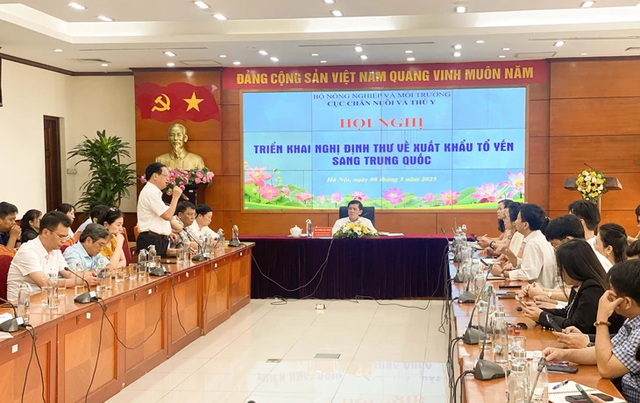
China requires aluminum residue testing for bird’s nest shipments from Vietnam
Vietnamese bird’s nest exporters must now test for aluminum residues in their products, with levels not exceeding 100mg per kilogram of dry weight, as per new Chinese import regulations.
The requirement is part of a revised protocol for exporting raw and cleaned bird's nests to China, discussed on Thursday at a conference on the protocol's implementation.
Do Thi Thu Phuong, a representative from the Department of Animal Husbandry and Veterinary Medicine under the Ministry of Agriculture and Rural Development, said the regulation was introduced due to past instances where producers used bleaching agents containing aluminum.
"This is not unique to Vietnam," Phuong said.
"Indonesia and Malaysia face the same requirement,"
Despite the protocol being signed four years ago, Vietnam has exported only around four metric tons of bird's nests to China, earning approximately US$4 million, a figure that falls short of the country's production potential and the size of the Chinese market.
Phuong attributed the low export volume to Vietnam's late entry into the Chinese market, more than a decade behind Malaysia and Indonesia.
As a result, Vietnamese bird's nest brands remain unfamiliar to many Chinese consumers.
Furthermore, underdeveloped processing techniques, high production costs, and less appealing packaging make it difficult for Vietnamese products to compete regionally.
The revised protocol, which replaces the 2022 version, introduces several updated requirements.
Among them is a new processing temperature standard: bird's nests must be heated to over 70 degrees Celsius for at least 3.6 seconds to ensure the destruction of avian influenza and Newcastle disease viruses.
Exporting companies must also obtain safety certificates for both diseases.
However, export shipments will now only require quarantine certificates, no longer needing certificates of origin.

Delegates at the conference on the implementation of the protocol on exporting raw and cleaned bird’s nests to China in Hanoi, May 8, 2025. Photo: C.Tue / Tuoi Tre
The new protocol also includes the condition that production capacity must be "appropriate," a previously undefined standard.
Phuong explained that this requires businesses to provide reasonable, accurate declarations.
For instance, if a company claims it can process several metric tons of bird's nests but has only small-scale machinery, its capacity would be deemed inappropriate.
Phuong also stressed the importance of robust management and traceability systems.
She noted that Chinese authorities have flagged issues such as Vietnamese companies importing low-quality bird's nests for reprocessing or registering bird houses with codes that do not match the volume of declared exports.
These discrepancies have raised concerns about whether the exports are genuinely sourced from registered facilities.
Vietnam's bird's nest industry has seen rapid growth in recent years.
As of the end of 2024, the country had approximately 29,320 registered bird houses, an increase of more than 21,000 compared to 2017.
With a large swiftlet population, Vietnam is now considered to produce some of the highest-quality bird's nests in the region.
Thanh Ha - Chi Tue / Tuoi Tre News
Link nội dung: https://news.tuoitre.vn/china-requires-aluminum-residue-testing-for-birds-nest-shipments-from-vietnam-103250509135150821.htm